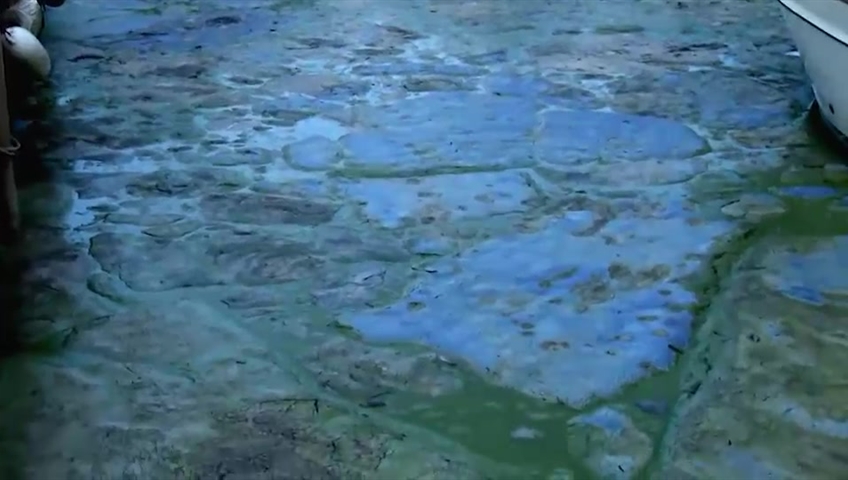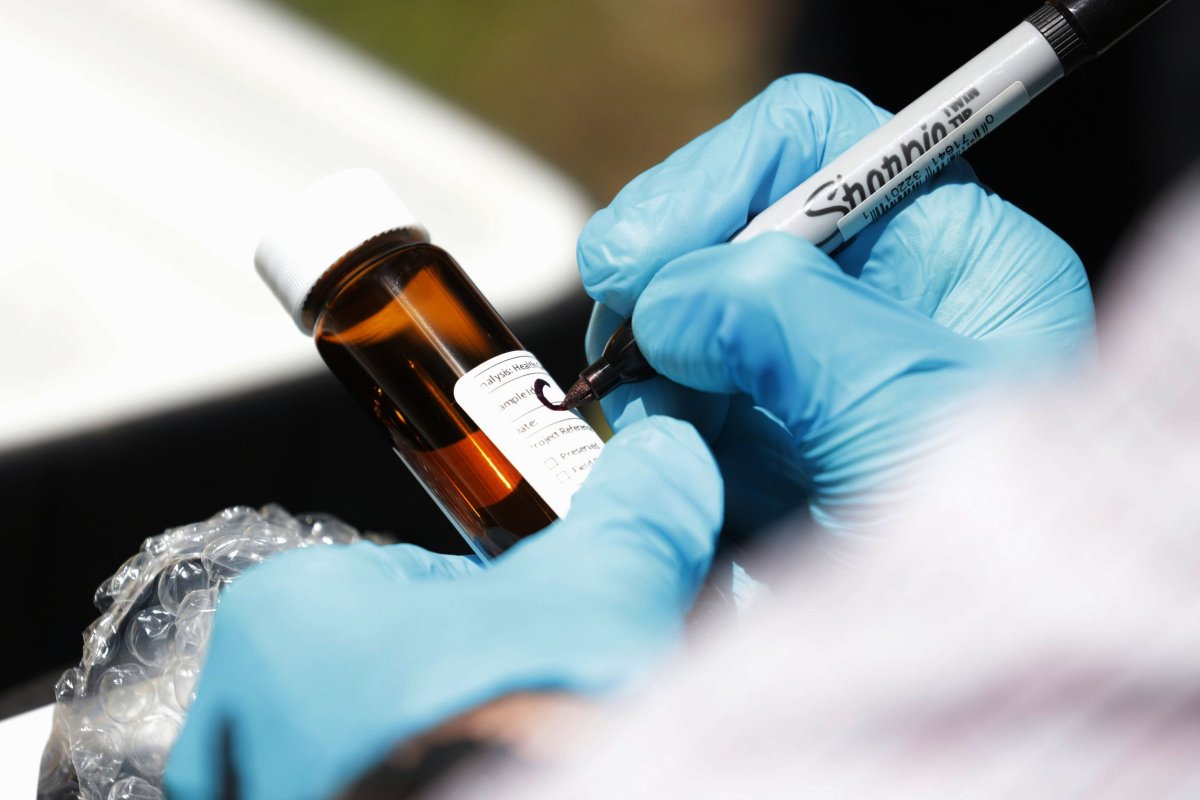It hasn’t been confirmed yet, but a blue-green algae bloom is likely to blame for a water contamination at Grand Lake that sent one person to hospital and killed two dogs.

Staff from Nova Scotia’s Department of Environment and Climate change took samples at the lake Thursday after an emergency alert was sent out early that morning advising people to stop using the water immediately for drinking, brushing teeth, showering, boating and swimming.
Fire officials later confirmed two dogs had died that night — one of whom went into the lake and one of whom only went near it. A woman who went in to rescue the dog was taken to hospital.
Friday afternoon, deputy minister Julie Towers said staff did a combination of tests on the samples, taken from both Grand Lake and Fish Lake, which is connected by a culvert.
Towers said they conducted rapid tests for the toxins associated with blue-green algae, which came back negative – but she said that’s not surprising because it can be “tricky to detect.”
“As we know, the (weather) conditions had changed quite a bit between the two days. Especially with the wind, it disperses things,” she said. “Anyone who was out there would have seen the waves. There was a lot of movement yesterday.”
Blue-green algae, or cyanobacteria, is a natural freshwater algae. During the summer, it grows rapidly and extensively, also known as a bloom.
Towers noted that first responders who originally attended the lake took pictures, which showed a vibrant sheen associated with algae blooms.
She also said the symptoms of the woman who was hospitalized, and of the two dogs who died, were consistent with contact with blue-green algae.
She said tests were also being done to detect metals and other chemical contaminants, which has been sent to the testing lab. Those results should be back Monday or Tuesday.
Towers said staff continue to take samples on Friday. The advisory to not use the water will remain in place over the weekend.
Even if it wasn’t blue-green algae, Towers said it’s important for people to familiarize themselves with algae blooms as the weather continues to heat up.
“Algae, like any plant, responds to warmth,” she said.
“We’re getting warmer – climate change, we’re seeing effects. I would suspect that we’re going to have more blooms in more sites, so I think it’s important for people to inform themselves of the potential effects.”
People who swim in water contaminated by blue-green algae can experience itchy and irritated skin and eyes, hay fever-like allergy symptoms, hives, rashes and blisters. Those who drink it can get headaches, fever, diarrhea, vomiting, cramps, muscle, joint pain, and liver damage.
Reports of the toxic blooms in Atlantic Canada have been increasing in recent years, with veterinarians issuing public warnings when dogs die suddenly. It is also increasingly common for chief medical officers of health to issue advisories in early summer to warn people to check bodies of water and shorelines for the algae as warm weather arrives.
- Trudeau says ‘good luck’ to Saskatchewan premier in carbon price spat
- Canadians more likely to eat food past best-before date. What are the risks?
- Hundreds mourn 16-year-old Halifax homicide victim: ‘The youth are feeling it’
- On the ‘frontline’: Toronto-area residents hiring security firms to fight auto theft
The journal Nature recent published a study of nearly 400 lakes in the United States and Europe where oxygen levels have been dropping over the past four decades. The authors argued the declining oxygen levels could lead to increased algal blooms, and they link the trend to warming temperatures and decreased water clarity due to human activities.
Municipality giving out water
Both Halifax Water and the Municipality of East Hants have stressed that municipal water continues to be safe to drink, and only those who have water feeds directly from the lake are at risk.
While most wells are safe, homeowners with wells that are 30 metres deep or less, and are located within 60 metres of Grand Lake, should not use their well water for drinking.
It’s not clear how many people are affected by the water advisory, but Jesse Hulsman, the director of infrastructure and operations for the municipality, said it’s likely to be in the hundreds.
“If you are drawing from lakewater or river level, we’re setting up ways to support you over the weekend,” he said.
People who need water can pick some up at the East Hants Aquatic Centre on Friday until 8 p.m., and on Saturday, Sunday and Monday from 8 a.m. to noon, and from 5 p.m. to 8 p.m.
People must bring their own containers to fill with water and COVID-19 protocols must be observed. Coca-Cola has also donated some bottled water, said Hulsman.
In a release, HRM said residents will be provided with two litres of water per person per day, in addition to one litre per day for pets. Residents may collect up to two days’ worth of water at a time.
Additional water is available from the Station water supply if residents bring their own sanitized containers.
“If uncertain about the cleanliness of a personal container, it is recommended to boil the water for two minutes,” said HRM.
Eleanor Roulston, the warden of the municipality, said they have also discussed potentially opening shower facilities at the aquatic centre for people who are affected.
“For those folks who are impacted, this is certainly a great inconvenience,” she said.
Due to the Grand Lake situation, the Department of Fisheries and Oceans said all types of fishing has been suspended in the Grand Lake watershed, which includes the entire length of the Shubenacadie River.
“Please avoid these areas, and remember that eating contaminated fish can cause serious illness or be fatal,” the department said in a tweet.
— with files from Jesse Thomas and The Canadian Press






Comments